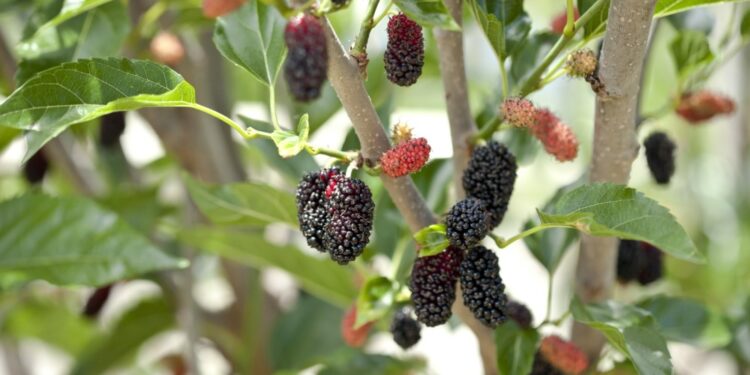For centuries, mulberries have been celebrated across different cultures not only as a sweet, delicious fruit but also as a powerhouse of nutrition and medicine. Known botanically as Morus, mulberries belong to the Moraceae family and thrive in various climates around the world. From traditional Chinese medicine to modern nutritional science, mulberries have carved a prominent place in discussions about holistic health and natural remedies.
Brief overview of mulberries
Mulberries grow on deciduous trees, which can be found in Asia, Africa, Europe, and the Americas. The most common varieties include:
- White mulberry (Morus alba): Native to China and historically used in silkworm cultivation.
- Black mulberry (Morus nigra): Prized for its tangy flavor and medicinal use.
- Red mulberry (Morus rubra): Native to North America with a sweeter profile.
These berries can be consumed fresh, dried, or processed into juices, teas, and dietary supplements. Beyond the fruit, mulberry leaves and bark also carry medicinal properties, making the plant an all-around health resource.
Nutritional profile of mulberries
Mulberries are nutrient-dense while being relatively low in calories, which makes them an ideal addition to a balanced diet. A 100-gram serving of fresh mulberries typically contains:
- Calories: 43
- Carbohydrates: 10 g
- Protein: 1.4 g
- Fat: 0.4 g
- Fiber: 1.7 g
- Vitamin C: 36% of the Daily Value (DV)
- Vitamin K: 14% DV
- Iron: 14% DV
- Calcium: 6% DV
- Potassium: 8% DV
In addition to these macronutrients and micronutrients, mulberries are particularly rich in antioxidants such as anthocyanins, resveratrol, and flavonoids. These compounds are vital in reducing oxidative stress and protecting against cellular damage.
Health benefits of mulberries
Here are the key health henefits of mulberries.
1. Rich source of antioxidants
Oxidative stress, caused by free radicals, contributes to premature aging and the development of chronic diseases such as cancer, cardiovascular disease, and neurodegenerative disorders. Mulberries are abundant in anthocyanins and resveratrol, two potent antioxidants.
- Anthocyanins help protect against cellular damage and reduce inflammation.
- Resveratrol, also found in grapes and red wine, is linked to improved heart health and anti-aging effects.
Consuming mulberries regularly helps neutralize free radicals, supporting long-term health.
2. Boosts immune function
Mulberries are an excellent source of vitamin C, which is crucial for immune system function. Vitamin C stimulates the production of white blood cells, enhances the body’s ability to fight off infections, and accelerates wound healing. Regular intake of mulberries can therefore fortify natural defenses against seasonal illnesses such as colds and flu.
3. Supports heart health
Cardiovascular disease remains one of the leading causes of mortality worldwide. Mulberries help protect the heart through several mechanisms:
- Lowers bad cholesterol (LDL): The flavonoids in mulberries help reduce LDL cholesterol levels while improving HDL (good cholesterol).
- Improves circulation: Resveratrol relaxes blood vessels, improving blood flow and reducing hypertension risk.
- Reduces inflammation: Chronic inflammation contributes to atherosclerosis; antioxidants in mulberries combat this process.
Together, these effects make mulberries a heart-friendly fruit that supports vascular health and reduces cardiovascular risks.
4. Helps regulate blood sugar
Mulberries contain compounds such as 1-deoxynojirimycin (DNJ), which inhibits an enzyme that breaks down carbohydrates into sugar. This slows the absorption of glucose in the bloodstream, leading to better blood sugar regulation. Studies suggest that mulberries may help manage type 2 diabetes by improving insulin sensitivity and reducing post-meal blood sugar spikes. Mulberry leaves, in particular, are widely used in teas and supplements designed for glycemic control.
5. Promotes digestive health
The dietary fiber in mulberries aids in digestion and promotes gut health. Fiber helps:
- Improve bowel regularity.
- Prevent constipation.
- Support beneficial gut bacteria.
Additionally, mulberries have mild natural laxative properties, making them helpful for maintaining digestive balance.
6. Improves blood health
Iron deficiency anemia is a common global problem, and mulberries provide a plant-based source of iron. Iron is essential for the production of hemoglobin, the protein responsible for transporting oxygen in the blood. Alongside vitamin C – which enhances iron absorption – mulberries contribute to maintaining healthy blood and preventing anemia-related fatigue and weakness.
7. Supports bone strength
Bone health becomes increasingly important with age, especially for those at risk of osteoporosis. Mulberries contain calcium, magnesium, vitamin K, and iron, all of which play essential roles in maintaining strong, resilient bones. Regular consumption may help reduce the risk of fractures and age-related bone deterioration.
8. Promotes healthy skin and hair
Mulberries are often incorporated into natural beauty regimens due to their antioxidant and vitamin content.
- Skin: Vitamin C supports collagen production, keeping skin firm and youthful. Antioxidants also help reduce signs of aging such as wrinkles and pigmentation.
- Hair: Mulberries improve blood circulation to the scalp and strengthen hair follicles. Traditional remedies use mulberry juice or extracts to promote hair growth and reduce premature graying.
9. Enhances brain health
Mulberries contain polyphenols and flavonoids that may help protect neurons from oxidative damage. Resveratrol has been linked to improved cognitive function, reduced neuroinflammation, and protection against Alzheimer’s and Parkinson’s diseases. While more research is ongoing, mulberries show promise as a natural brain-boosting food.
10. Potential anti-cancer properties
Early studies suggest that compounds in mulberries may help inhibit tumor growth. Resveratrol and anthocyanins demonstrate anticancer activity by inducing apoptosis (programmed cell death) in cancer cells and preventing metastasis. While not a cure, incorporating mulberries into the diet contributes to an anti-inflammatory, cancer-preventive lifestyle.
11. Weight management support
Mulberries are low in calories but high in fiber, making them a filling and nutritious snack. By promoting satiety and slowing digestion, mulberries can help reduce overeating and stabilize energy levels throughout the day. Additionally, the presence of DNJ supports weight management by modulating carbohydrate metabolism.
Traditional uses of mulberries
In traditional Chinese medicine, mulberries (sang shen) have long been valued for nourishing the blood, strengthening the liver and kidneys, and treating conditions like anemia, fatigue, and premature graying of hair. Mulberry leaves were prescribed for lowering blood sugar, while mulberry bark was used for respiratory ailments such as coughs and asthma. These ancient uses align with modern research findings, demonstrating how traditional wisdom often anticipated scientific discovery.
Incorporating mulberries into your diet
Mulberries can be enjoyed in a variety of ways:
- Fresh fruit: Eaten raw as a snack.
- Dried mulberries: A sweet, chewy substitute for raisins or other dried fruits.
- Smoothies and juices: Blended with other fruits for a nutrient boost.
- Mulberry tea: Particularly from the leaves, for managing blood sugar.
- Baking: Added to muffins, pies, or bread.
- Toppings: Sprinkled over yogurt, oatmeal, or salads.
When purchasing dried mulberries, it is best to select unsweetened varieties to avoid excess sugar intake.
Precautions and considerations
While mulberries are generally safe, some considerations include:
- Allergies: Rare, but possible in sensitive individuals.
- Blood sugar levels: Those on diabetic medication should monitor blood sugar closely when consuming mulberry supplements.
- Pregnancy and breastfeeding: More research is needed; moderation is advised.
- Interactions: Mulberries may interact with blood-thinning medications due to their vitamin K content.
Consulting a healthcare provider is advisable before introducing mulberry extracts or supplements into a medical regimen.
Conclusion
Mulberries are far more than just a delicious seasonal fruit – they are a treasure trove of health-promoting nutrients and bioactive compounds. From supporting heart and brain health to regulating blood sugar, boosting immunity, and promoting youthful skin, mulberries offer a holistic approach to wellness. Their benefits, rooted in both traditional medicine and modern science, make them an invaluable addition to a health-conscious lifestyle. Whether eaten fresh, dried, or as a tea, mulberries prove that nature’s sweetest gifts often come with the greatest healing power.


































































































































































































